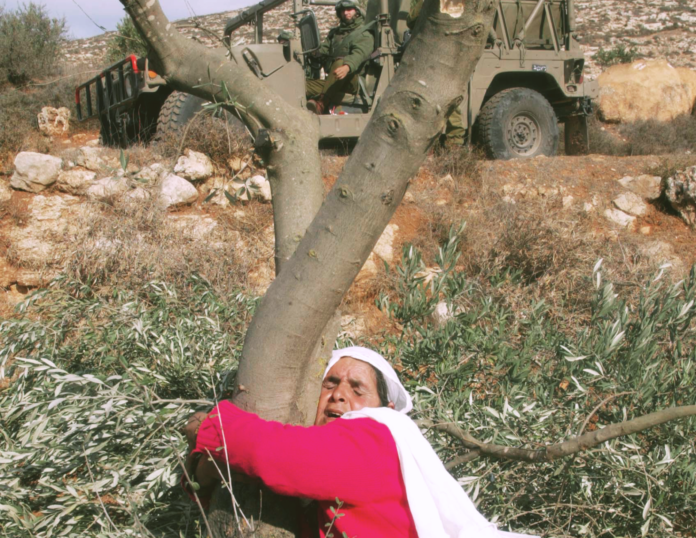In the heart of a hot, arid, water-scarce region, the impact of climate change on Palestinians is intensified, particularly through the implementation of Israeli practices and policies. Israeli militarism and occupation of Palestine are dispossessing Palestinians of their land, violating their freedom of movement and their right to self-determination, rendering conditions that of an open-air prison. Israel’s policies of apartheid, and therefore eco-apartheid, compound the hostile living conditions for Palestinians as they brave newer threats of escalating negative impacts of climate change.
Read More: Israel’s Water Apartheid Policies in the Palestinian West Bank and Gaza Strip
Israel practises eco-apartheid, a practice which commits ‘environmental abuse in order to marginalize a racially defined group’. This practice is mirrored in South Africa – where the government consigns most of their population to the ‘least healthy and least productive ecological contexts’, therefore, leaving them financially dependent on the capital of their oppressors – ‘White-owned capital’, specifically (Stull, Bell and Ncwadi, 2016). Green colonialism refers to the stark contrast of living achieved by the Global North at the hands of the Global South; ‘Global North achieves a high standard of living by exploiting the health, labour and land of the Global South’. (earth.org, 2021). This is carried out by Israel over the Palestinian territories through their ‘political and economic control of land, water and other natural resources’, thereby leaving Palestinians without autonomy over land cultivation and resource management (Persavalli, 2021). Israel further carries out its apartheid system by climate oppression – also known as ‘climate injustice’ – which is achieved through their withholding of resources, contributing to the active prevention of Palestinians from developing strategies to mitigate and resist the impacts of climate change (Al-Haq, 2021).
Green Colonialism through Land Theft
Israel’s ongoing theft of Palestinian lands has a significant impact on the ability of Palestinians to maintain their livelihoods and adapt to the changing climate. Intense militarization with arbitrary checkpoints across Occupied Palestine severely limits the freedom of movement of its people, forcing them to go through dehumanizing processes of apartheid whilst they go about their everyday lives.
The planting of pine forests, which deliberately resemble European landscape imagery for the European Jewish settlers, contain highly acidic pine needles. When fallen, these pines destroy the shrubbery and plants growing on the land. In turn, this affects the grazing available for animals that shepherds rely on for their livelihoods (Lorber, 2018).
The Israeli government continues to commit green colonialism in Palestine, evident through its practice of pilfering large amounts of Palestinian land under the pretence of environmental protection.
The Jewish National Fund (JNF) set about creating over 1000 parks for Israeli residents, under the guise of ‘greenification’ of supposed ‘desolate desert areas’. Under the slogan, ‘Make the desert bloom’, the installation of these parks had a more devastating purpose than it would appear. These forests included ‘fast-growing pines’, which were ‘strategically placed atop the ruins of destroyed Palestinian villages’. Thereby, seeking to permanently erase evidence of Palestine’s pre-existence, and ultimately, ‘prevent[ing] refugees from ever returning to their homes’ (Persavalli, 2021).
The majority of the trees that Israel boasts of having planted have been replaced with non-native species that require more water to survive, leading to desertification, widespread forest fires and drought. Moreover, since 1967, Israel has uprooted more than 1 million native olive and fruit trees in Occupied Palestine leading to soil erosion and increased food insecurity. This is supported by the deforestation statistics whereby ‘95% of the forests of Gaza have disappeared between 1971 and 1999, due to the extensive spread of settlements and military bases’ (Persavalli, 2021).
Read More: Seeds of Resilience in Palestinian Agriculture
This blatant land theft where Israel has stolen Palestinian lands to construct illegal Israeli settlements, has led to biodiversity loss, the destruction of natural ecosystems, desertification, and water pollution.
Eco-Apartheid
Israel is projecting Palestinians to eco-apartheid – further defined as ‘inter-institutional arrangements and interactions that produce unequal environmental benefits and burdens’. ( Akom, 2011). The Israeli West Bank Segregation Wall denies Palestinians their land and thus prevents Palestinians from cultivating them, which has led to increased food insecurity, desertification, and habitat destruction of animals and migratory birds.
The construction of the West Bank Wall carries a number of environmental impacts. Including, isolating Palestinian farmers from their local lands and thereby harming local ecosystems and removing their access to a livelihood.
Israel practises theft of Palestinian water, stealing over 80% of available water in the Occupied West Bank, and redirecting it to illegal Israeli settlements for filling swimming pools and crop irrigation (IMEU, 2022). Inevitably, this denies Palestinians access to water security and subsequently denies their rights to ‘water, food, health, work and an adequate standard of living’ (Amnesty International, 2017).
Read More: Climate Oppression, Eco-Apartheid & Palestinian Occupation
Israeli industrial settlements regularly release air filled with toxic pollutants and dump wastewater containing untreated sewage into Palestinian villages, polluting the water and soil. The pollution and pesticides from these settlements cause significant health problems to those living in the Palestinian communities nearby. Cancer, asthma and genetic health disorders are just some of the conditions being suffered. With these health conditions, Palesintians’ ability to earn a living is greatly affected (IMEU, 2022).
Despite its ongoing eco-apartheid, Israel hides behind green colonialism by using environmentalism as a justification for its occupation and colonization of Palestinian lands. Not only are Israel’s illegal settlements in the West Bank established on stolen lands, but Israel also seeks to justify its land theft under the pretext of protecting nature reserves. In reality, two-thirds of all the trees planted, and the parks established by Israel are built on the demolition of 89 Palestinian villages. Through the controlling of Palestinian lands and its people, Israel practises settler colonialism through methods of green colonialism. By presenting itself as an ‘eco-friendly’ country, Israel aims to detract international attention from its extensive human rights violations against Palestinians. Israel’s green colonialism has irreversibly caused grave environmental damage on Palestinian lands, aggravating the effects of climate change and committing a war crime (IMEU, 2022).
The depoliticizing of climate apartheid in Occupied Palestine involves international donor-driven strategies that emphasize fostering peace and cooperation, rather than pressuring Israel to put an end to its occupation. For instance, initiatives funded by donors, such as EcoPeace and the Arava Institute, have consistently utilized slogans such as “the environment knows no borders” and “bringing people together” to advance collaboration between Israel and Palestine centred around climate and environmental justice. However, these initiatives only serve to normalize and legitimize the Israeli occupation by presenting it as sustainable development, and environmental action.
Climate Justice for Palestine
The struggle for climate justice in Palestine is tied to the Palestinian freedom struggle. A few practical steps for climate justice for Palestine entail opposing Israel’s export of natural gas and electricity to Europe, as well as boycotting international projects including Mekorot, which promotes water apartheid by denying Palestinians access to water and supporting Israel’s illegal settlements. It also involves boycotting all Israeli Medjool dates, which are cultivated in the Jordan Valley using land and water taken from Palestinians. Moving towards a path of climate justice cannot be achieved without addressing the underlying injustices of the Israeli occupation of Palestinian land.
References
- Al- Haq (2021). Climate oppression: a major tool to establish and maintain Israel’s apartheid regime over the Palestinian people and their lands. Report to OHCHR.
- Earth.Org (2021) What is green colonialism?, Earth.Org. Available at: https://earth.org/green-colonialism/ (Accessed: 03 September 2023).
- Imeu (2022) IMEU Institute for middle east understanding, IMEU. Available at: https://imeu.org/article/environmental-apartheid-in-palestine (Accessed: 03 September 2023).
- Lorber, B. (2018) Israel’s environmental colonialism and Ecoapartheid – The bullet, Socialist Project. Available at: https://socialistproject.ca/2018/06/israels-environmental-colonialism-and-ecoapartheid/ (Accessed: 03 September 2023).
- Persavalli, L. (2021) Biodiversity Loss in Palestine. the green colonialism., zeroCO2. Available at: https://zeroco2.eco/en/2021/05/18/biodiversity-loss-in-palestine/ (Accessed: 03 September 2023).
- Stull, V., Bell, M.M. and Ncwadi, M. (2016) ‘Environmental apartheid: Eco-health and rural marginalization in South Africa’, Journal of Rural Studies, 47, pp. 369-380 Available at: 10.1016/j.jrurstud.2016.04.004.
- The Occupation of Water (2022) Amnesty International. Available at: https://www.amnesty.org/en/latest/campaigns/2017/11/the-occupation-of-water/ (Accessed: 03 September 2023).



